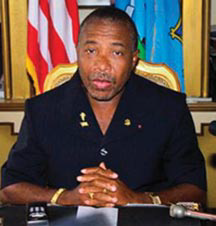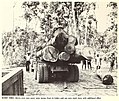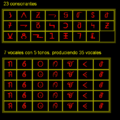The Liberia Portal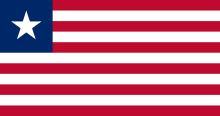 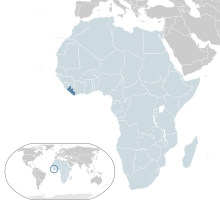 Liberia (/laɪˈbɪəriə/ ), officially the Republic of Liberia, is a country on the West African coast. It is bordered by Sierra Leone to its northwest, Guinea to its north, Ivory Coast to its east, and the Atlantic Ocean to its south and southwest. It has a population of around 5.5 million and covers an area of 43,000 square miles (111,369 km2). The official language is English. Over 20 indigenous languages are spoken, reflecting the country's ethnic and cultural diversity. The capital and largest city is Monrovia. Liberia began in the early 19th century as a project of the American Colonization Society (ACS), which believed that black people would face better chances for freedom and prosperity in Africa than in the United States. Between 1822 and the outbreak of the American Civil War in 1861, more than 15,000 freed and free-born African Americans, along with 3,198 Afro-Caribbeans, relocated to Liberia. Gradually developing an Americo-Liberian identity, the settlers carried their culture and tradition with them while colonizing the indigenous population. Led by the Americo-Liberians, Liberia declared independence on July 26, 1847, which the U.S. did not recognize until February 5, 1862. Liberia was the first African republic to proclaim its independence and is Africa's first and oldest modern republic. Along with Ethiopia, it was one of the two African countries to maintain its sovereignty and independence during the European colonial "Scramble for Africa". During World War II, Liberia supported the U.S. war effort against Nazi Germany and in turn received considerable American investment in infrastructure, which aided the country's wealth and development. President William Tubman encouraged economic and political changes that heightened the country's prosperity and international profile; Liberia was a founding member of the League of Nations, United Nations, and the Organisation of African Unity. The Americo-Liberian settlers did not relate well to the indigenous peoples they encountered. Colonial settlements were raided by the Kru and Grebo from their inland chiefdoms. Americo-Liberians formed into a small elite that held disproportionate political power, while indigenous Africans were excluded from birthright citizenship in their own land until 1904. In 1980, political tensions from the rule of William R. Tolbert resulted in a military coup, marking the end of Americo-Liberian rule and the seizure of power of Liberia's first indigenous leader, Samuel Doe. Establishing a dictatorial regime, Doe was assassinated in 1990 in the context of the First Liberian Civil War which ran from 1989 until 1997 with the election of rebel leader Charles Taylor as president. In 1998, the Second Liberian Civil War erupted against his own dictatorship, and Taylor was overthrown by the end of the war in 2003. The two wars resulted in the deaths of 250,000 people (about 8% of the population) and the displacement of many more, with Liberia's economy shrinking by 90%. A peace agreement in 2003 led to democratic elections in 2005. The country has remained relatively stable since then. (Full article...) Selected article -Charles McArthur Ghankay Taylor (born 28 January 1948) is a Liberian former politician and convicted war criminal who served as the 22nd president of Liberia from 2 August 1997 until his resignation on 11 August 2003 as a result of the Second Liberian Civil War and growing international pressure. Born in Arthington, Montserrado County, Liberia, Taylor earned a degree at Bentley College in the United States before returning to Liberia to work in the government of Samuel Doe. After being removed for embezzlement and imprisoned by President Doe, Taylor escaped prison in 1989. He eventually arrived in Libya, where he was trained as a guerrilla fighter. He returned to Liberia in 1989 as the head of a Libyan-backed rebel group, the National Patriotic Front of Liberia, to overthrow the Doe government, initiating the First Liberian Civil War (1989–1996). Following Doe's execution, Taylor gained control of a large portion of the country and became one of the most prominent warlords in Africa. His forces, along with those of other rival warlords such as ULIMO were notorious for committing widespread human rights abuses and atrocities during the civil war. Following a peace deal that ended the war, Taylor was elected president in the 1997 general election as a member of the National Patriotic Party (NPP). During his term of office, Taylor was accused of war crimes and crimes against humanity as a result of his support for the Revolutionary United Front (RUF) rebel group in the Sierra Leone Civil War (1991–2002). Domestically, Taylor attempted to consolidate power through dictatorial means such as by purging the military and committing violence against his political rivals, including an assassination attempt of former ULIMO commander Roosevelt Johnson, leading to violent clashes in Monrovia in 1998. As a result, opposition to his government grew, culminating in the outbreak of the Second Liberian Civil War in 1999. By 2003, Taylor had lost control of much of the countryside and was formally indicted by the Special Court for Sierra Leone. That year, he resigned, as a result of growing international pressure; he went into exile in Nigeria. In 2006, the newly elected President of Liberia, Ellen Johnson Sirleaf, formally requested his extradition. He was detained by UN authorities in Sierra Leone and then at the Penitentiary Institution Haaglanden in The Hague, awaiting trial by the Special Court. He was found guilty in April 2012 of all eleven charges levied by the Special Court, including terror, murder and rape. (Full article...) Did you know -
More Did you know (auto generated)
Selected image -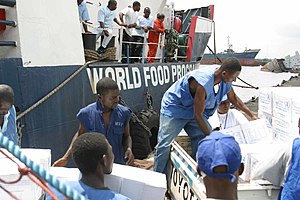 Credit: 26th MEU(SOC) PAO, United States Marines
The Martin, a World Food Programme ship unloads pallets of high energy biscuits at the Freeport of Monrovia on August 15, 2003 during the Second Liberian Civil War. TopicsCities and townsRelated portalsWikiProjectsAssociated WikimediaThe following Wikimedia Foundation sister projects provide more on this subject:
SourcesDiscover Wikipedia using portals |
